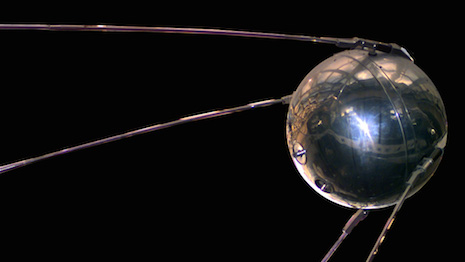By Daniel Hodges
Coco Chanel said, “Fashion is not something that exists in dresses only. Fashion is in the sky, in the street, fashion has to do with ideas, the way we live, what is happening.” The “way we live” is will increasingly being shaped by the “Intelligent Luxury Economy.”
The intelligent luxury economy is changing the way that luxury consumers work, live, learn, create and play. It is a mash-up of intelligent cyber-physical systems that create new capabilities for people and machines.
Smart luxe
The Internet of things (IoT) meets the luxury of things (LoT) with connected cars, sensors in homes and smart clothing as present-day examples of the intelligent luxury economy.
The intelligent luxury economy is powered by imagination, design, innovation and massive amounts of data.
Amazon, Google, Microsoft, Facebook, AT&T, Verizon, Sprint, T-Mobile, other global telecoms players, SAP, Oracle, Palantir and many others are well positioned to capitalize on the intelligent luxury economy.
Ralph Lauren introduced the data-rich biometric smart shirt in 2014 at the U.S. Tennis Open. It is an early example of what to expect.
Innovative companies such as Ralph Lauren are following the founder’s vision.
“The clothes that I design and everything I've done is about life and how people live and how they want to live and how they dream they'll live,” Mr. Lauren said. “That's what I do.”
Each phase of past revolutions had distinct characteristics and builds upon the prior revolution.
The first industrial revolution was propelled by the steam engine while the second industrial revolution was powered by electricity and the assembly line.
The third industrial revolution was enabled by technology and the mass efficiencies of the digital world.
Almost daily, we read about new technologies and innovative startups.
How do executives and the organizations they serve make the time needed to understand, prioritize and navigate in a period of accelerated change?
Who in your organization is tasked with understanding the impact of rapidly changing transformative technologies on the consumers and markets in which you operate?
How do these technologies and changing behavior affect your product or service and the bottom line? What is your plan to navigate the intelligent luxury economy in 2017?
Change measured in months
In the intelligent luxury economy, change cycles are measured in months versus years.
Take the launch in October 1957 of the Soviet launch of Sputnik, which stunned the world.
MIT scientists observed that the frequency of the radio waves transmitted by Sputnik increased as it approached the receiver and decreased as it moved away. This marked the creation of the Doppler effect.
Scientists observed that satellites could be tracked by measuring the radio waves. It took 60 years for the true effect of the Sputnik to be appreciated.
The concept of the modern day GPS in your phone or car was a direct result of the Sputnik launch. That was then and today cycles are shorter and impactful.
While the effect of Sputnik took 60 years, the global influence of the iPhone took only 60 months.
The smartphone user interface pioneered by Apple provides an example of the potential for explosive growth of the intelligent luxury economy.
The iPhone user interface elegantly marries cognitive thinking, sight, sound and motion with software. It caused the smartphone effect, which makes the smartphone an indispensable extension of our work and life today.
The impact of the iPhone and its unique user interface – replicated by its competitors – is projected to reach 5 billion smartphone users by 2020.
Apple cofounder Steve Jobs said at the launch of the iPhone that “every once in a while, a revolutionary product comes along that changes everything.”
When Mr. Jobs said “we’re gonna reinvent the phone. Now, we’re gonna start … with a revolutionary user interface ... the result of years of research and development, and, of course, it’s an interplay of hardware and software.”
Navigate, identify and capitalize
Angela Ahrendts, senior vice president of retail at Apple and former CEO of Burberry, said, “ I grew up in a physical world, and I speak English. The next generation is growing up in a digital world, and they speak social.
“Today, when you ask CEOs and CMOs today what is their long-term planning horizon, they will tell you that it is between 18 and 24 months,” Ms. Ahrendts said.
The following outlines the principles that will help your organization succeed, prosper and navigate the intelligent luxury economy.
Watch: While most observers watched the launch of Sputnik, few could translate the impact of the Sputnik launch to their organizations.
Again, it was the trained minds of the scientists at MIT who first noticed that the frequency of the radio signals transmitted by the small Soviet satellite.
Every inflection point sends signals that the trained expert can see and translate into action. This is the most difficult first part of the process.
Clayton Christensen, author of the “Innovator’s Dilemma,” says in his book that few companies can successfully navigate change.
One suggestion he offers to organizations is “watching how customers actually use a product provides much more reliable information than can be gleaned from a verbal interview or a focus group.”
Social media can also be very useful in trend detection. These are effective ways for companies to see how they need to observe change to meet consumer’s expectations in the intelligent economy.
Innovate: Innovation, learning and experimentation are a daily business requirement for business today.
“The customer is the final filter,” designer Marc Jacobs once said. “What survives the whole process is what people wear. I’m not interested in making clothes that end up in some dusty museum.”
Jack Ma, founder/CEO of Chinese Internet giant Alibaba, was reported as saying, “The lessons I learned from the dark days at Alibaba are that you've got to make your team have value, innovation and vision.
“Also, if you don't give up, you still have a chance,” he said. “And, when you are small, you have to be very focused and rely on your brain, not your strength.”
Peter Diamandis, cofounder of Singularity and chairman of the X Prize Foundation, had an equally smart insight.
“Companies have too many experts who block innovation,” he said. “True innovation really comes from perpendicular thinking.”
Indeed, Apple’s Jobs once said that "innovation distinguishes between a leader and a follower."
Navigate: Paradigms and change cycles are rapidly accelerating. Navigating your organization for a successful outcome in the intelligent luxury economy is a business requirement.
We now live in a fast-paced, 365-days-a-year, 24/7 global market. Most innovations and inventions seem random and serendipitous to the unobservant.
Staying on the cutting edge requires reading, networking and experimenting.
VOGUE EDITOR IN CHIEF Anna Wintour was once quoted as saying, “It is so important for designers not to run scared, and not to be too worried about what's safe and what's commercial.”
I believe management guru Peter Drucker got it right when he said that “the best way to predict the future is to create it.”
 Dan Hodges is CEO of Consumers in Motion
Dan Hodges is CEO of Consumers in Motion
Daniel Hodges is CEO of Consumers in Motion Group and a member of the American Association of Political Consultants. Reach him at [email protected].
{"ct":"5hNvhsRHESoYFe9dPd1O\/nlX0C0SmPOUpAJDX8u+fwFhR23NK2AZpjcGhHwxqlCuvfWb3ct9Y\/xELGh\/jiCfY6mc48vAABkhoTtYBLd9Recz1Z+CHV5ECfqk0++Egk8rJoHJS6yHo9XlqnheM29SJJG38NSFwMtD7NMV93rzN5KSGp3YriaIMLDSW7LNQ5gXhrJTBSrshN1+xzGON3EMA5NjxM3olzG5W7jNfdKk6IlXFAHy94hBPWTdMKHezaVycQ9VZXmH0XsGwZauN2ZjsduSQuiMc\/Vxbm96KrllmoafeyWGxCYI7i2wW1LTwuilEh6Re3sTLulzbnw\/zXdHjtwHe8gomrrUGMJS+XzGMYUFmsFSEpflFZLzy553zfIXWxsmExDC8XiOyfwvmSHuJEef3RxwiUrax+yi9TZZz5VtJ9iYA7ZM19fgQyRKM2564xriYqP6fjp97DEFz6+Vvr3jKnoaKO8PBdMqMUT\/xMEEvBf4bmim1\/VId5fu4VNQ\/1FDdTfzH0yDSIwI2mzyFVxOBY6zWIMuKyk+gXKzf1dBDl9qJ1CNeOqsElRV+XzvaSiRhs\/Go4MU\/JoT34laQHKUuBLbCAEIebofdQF4OAqO3jVLxKFZ12pyTT4VbCNvlXxlLV\/sj9MxYgKdCOYyKdGko0g21HHYOtR1VmAti\/kw1MxNzrjkL5rYnxAUyX+8MLgA4RVN5\/IluYsJdP562Qo5n5SuHj8wvO0yjYTq90bzBDFleJPb7LPmsus3EMIpeGI1sFT4SYCN5rlwNOwyEcciXuI4MumRg2VFdj+x62i\/syEvFJc5Ho5UY4o6uuFzxjgzK3W1a3te2zDgdxK1nIp+bSRMoPMLLCN5zeRrF9PpN+JmnRTA+E2HUY3lQS7LIkVaDw56HmmS6tfQpoEjPblZou4ei3MD7eCcvWRHAqB7KX9w3P+dC2G5o8UxJriyguuKAwiReyVm0CqVuFx\/t5RWmSvL7yKGVr94uzrtbq+uOKYeMFe6RRQaiqJiiPHyNJMOIWYZwuTxsXahMu8DOhyAMsSqhRQrICuAmRFUYJmqdDvUD75Kg17jjHkLi1QMpc1jltVybNL5IWygg85Q3xJZ3BB5bBF70b1JZ1iHrqy0omujc1QDWhXE7MxghhPK3VsGIhCmxkHYq3syMqBKRJ6bAbWUGf\/Vb5rArfHxjTq07ROv0M8nQ8MLcSnV\/DtY+djyJCKAPvLG4CqHPCY3L80MvVezFj\/Tg\/Pyd23xCIk8kXQH751VFL6or7j+CFoRCouGTvsDAHf+sk+8zcUnZBinVrLNQWU8HtrD54+wyKANjJ+TpvKH7ebQTTeQxEfIvS4njn2bIOyLXT4Xq9w8PsybdQPjjBMOZ8L7+kRq3RGqwsamAkayoyXLb9I07iESTqY55DRbP2XMs8WBaOuj\/5Xrfvea8nhKRGmIyyL+sYMXcIHGC1r7jMHtSishSVz6lYxGAYW7OM1qTaSWEjJ57HIwhY2CDOvl6SPRRZA7uc+5fxHeFyUBlMTW3qplTPlXli2NzVyPUaSuHOP6\/Z9z89w0Q1Qc3FTWAihIm3vhOPlD4gxneC9\/PbkBgi+1EQ\/jQAdjtHHssj5sqvXT2fmq917\/YnBFTZWnSR4WfdE+zHE\/IghWx6HOruvDVzrETABM1lDgkdlQDRpbDLKKdNkp0+bIFjAdhvFblfejz6+1DQYY0fysJrNU6VPbVmuRxhy8prIKbWVgzWljUKWxXQXuMhyOjzO5SErWfg2SbUr8WQbjC0\/hXP0+EEk7hPo16AfXjdFHFk9afbiLisy\/Csk7PpxyERpeBNIi8WdjFlFVRPQFesNeAcvbiprMqbWLZMJTClld3c54DcEVUzxTY+QP0mYZo9HmSijb0ZPb5vtTmCF21Z3SE0bQBPtdFNR5dhgLHA4DrKQasacCrm85C3ObXMOdIh7VVvohCwYL9LJuwRCpvVPwobtx0ZeIzJIhMlMcMsonQ1x00Oz\/vy0vn6hItpf16xD6ZQZRVCZAo54zAR+kUV++jvbSSXQz9IUZagyzwERHD+Bl3uvhLKcuZ+CdQjOQ7IjygWjncTLNif7X3Md+MuLVH5PzQR4CDBIwmJiuakVMBVceyIXACv10YsFDkUKN11AK2qrluwQ8p5YNELngV1\/Eb9NnocDYORQVB0GQ6EmDWjTlN4WA\/0sPU09otQs5IQgU2yGCgHmHdMoMnx8vFCXwYPxBsED4Z\/wTbQGdnMz2Ntiifdh5scXeaJ0AXmQ4N0doJ1DEDr\/95CtGlgCxdAijg\/QPTyFg\/fnC0g6nOuiY9LTC8JR3HJL0fLecAYvN78NC3MD2lVmM479FQbS5dVp+jb9U3oa\/WdbH\/CQohHtkUK\/ImM93vmDtoXo1hoQfkG0LPC3rZGDi1ExsZlbXlz0O7cXRTjb214lv\/M7EHeMNI0icS1+AqfrO1UKsT9ClqsQq+rPVv3Svrc4TkIqQ2JoKr3HCQ+dt1O0Axs1f9k917BI1kW3jrpBr\/i0kprHNVC5mDP5Zpq1WW5+55tmnMO7loxAHRECCd+QkZsq5V1dRkuvt3oXWq7YlaKJg\/BJy9q3RFE2X83PhDdmdp9CLbFmzK9mX0CaDp\/G5JHbJcxk+2Wr+E6dZ2flnJF9dtbb8DX7d+0wj6yFCZWLturkJo0WBfIhmRwA+T4s7THB78HpK6QcjyBew4Cj8xNgPPq8O4uKuihjgUNBT4VLDOewDlHAG2H4WOdGBNk7+5BaOOzDYmC6a58c6YEy0neRLE6kZkyCQ3thRxSET3bTLCW\/4wLqSo+g+pgxPxjt1MdQmFitfZ24PGnDkgXbxUu+M83iHfG046BF2bAaRtyN7FWe5828sYUPmaBjgTZqjF1lBhoA4LSDckDDA0sJgt\/BaockwxK+Vkxc+3w7yUuDVmogYSRN1pxRXeH8eskf6CYu1b9LFnbgnl2W4cIkFZBME\/ztA3TX+J0lSv1d3m8jZ\/Q5UKBrlzJENQ8pQ2tCmdb+uFk5TG9E7H\/UW3nzaxuS\/5o9g64LUTEXfNUSp5N\/DFjXRb6lFnqGuddGMLATHM1ev77pcSLY+2pJuQf8Mq7hesVVlLYV5A1MjSb0gltXMw9E9OG7vP86k1sdE2AMwFtmG8e\/8nXNJbdM6Dr0nyCeDboAFHExIvLrxIbN\/gTlOwFxWPGNifyrXTaGbDMGoTIS06\/7HIuno1moTapyxfaSvHOrOILguVxnR8G5IklobEG\/NrcVjMmRsbQq+Pigtp2Gce7RykLdO2MngAA+u3GkcifKYhKXrtxTPH0tdcRRtYHjxohgzkdRiIAXBvSF+zol\/GqmOtrd05MzWuFjV7xBLbewu9NH\/vCoFKkCdWP\/\/3dSFdvHMeiBxPIh5ky283EhDXOL2h9M4+pZ3xKd78m37n7yJHn\/hPmdQBLtdJSTnY5q1PuGcrh3gDRWh\/lW\/uOcMN\/Drv69BeuugjCeo4vtnVUtN7b9OmQ6u37xpNc6DzA5YM0jouzN3PN33KkC6S9VkhVUVHkzKE9+AOrDcRwDiz5WKIoPBwxWnL\/x281LPTUpjD7AH9g13BwXe9JqPn6NWo418xE2yRxp2j10m5uTJwCm1e4MYWj5iY05pmPrIT\/U9sNnE\/hekpk2tmE5YWs1yF4y+39I3MdrFD8MT6wwQVMwZ2NmXfJaYpegq+QWJVn0MICtnJKJ+4NREiFqJgoepF+xlKJ37Ibe6EmkAKFAIhMLeagzliL6R8C0ZgdTE\/elH39JdAYFiYPGahdtrSeGMnp4JB08kPOG1Mzv686KPFR95MIIJMn7Ivm+uCpSAeR7f4x0UMcXOSCkfDBIyIldJA1JcJDamhoE2X\/0nDy1747W6fagBBkA3HfjZTNZoQRhbjUgvJphVo+ViyQTF8+ejHfj2Tr5ccSgYVDAZHVeYEai9ZkGC8uMyCebxDTaGMefJf7sqyFPJ0Sak0q9iCnXEdI4QjnXtEA1957jXK53FvnADkIqiY5703n36rLu93NVhsC5XE7bdte87b\/nm0B8GvuRrChEVN7GSceLeLb5qV9KDx2V2QV9imZuh5ExofvcE29fUbLiIckJfLbY+CnunWk3+kJdbINISBM8TA\/86pPnvFPDoz3SysO0+v93Q4Vr9R297AtsZdNrkH8E0S6s5WoahIc2adLSyfC0R5ZeKMear3nhFRL6eq0iUo5kobwuxpVYDKlU2eZEnyW\/3CrDUSNq2hhN\/ruQ5sBn70ZOJI46pG7aFx8nqfSp01olEpyGP4e2eld3hImK0Ki3HBj4cSkt93h7tjcBHKb2b87TtNyn1sy5BtdYRntlWMDurDGFGBrZ9vpZmVPLnhtHUSmYMUiXOT2gVSuNwAl1s5KvrI8aSeGLHXQ2AFZSmzEZy0pRfJCdc\/ld9iwGR8SoIHFOp5wp71hk1rgUAegzw7pn5x1VYo662PhtDx+c44XZerfDsNrlFbeFciGzyuFsZNsIZpteUVEPz6pA\/Jbw2eoER5TNOg1RRvevNoG8QNtH0WnZdFQcUPH7sUsfqF31TOh4HlZSVWmQ\/DEL37urWNE0JRm+XhvT27IBEWv0N+Tod9nweaFxP4Qm1\/bLwAJDC2Ej8C2XYm9H7\/RJOT0xgSjNsMyBkBSHSPh5csRy\/+Hq0Nj2VJ4dHblo4rzeMOQg5jv1y98eJxFbi8ivK+P1xgcwULYhyj4qNhwJdhg9wZGodHhP7jDNneR7+27lp4qjecYyFOnu9h9CRKzyd66buyPzCro44fkcQIdkweNtJWy4bOh9QxGwVdISBEe4i6CaIMA3EgLeYar7tYc+wNozjWsfAtzcgMcsM6ZzUM4TVdGzp0XGAztIutzZGLnkUj40apwKBtKth9tzaC+BKVSOmeuRqitxjOejJQ1E+my7URIDQsi8gi4jwnw\/mnHGDW8kjIXxiI14SuOYoyILr7EXyecyPJwq6PZTlbz\/yLlIqKNEWyeCHuoIQc12RPLMnp6UshBLc44J+bdFF42eOpWiwocGmbEVw\/1pnGaTxcxhev4bypSvGVuGJcuF2S7VF6zvrPTFBgM+tTe4gX8NsxilXnraXXu1zpCTsmbJbZy1tjjI11Zo4s6vJgRJwykDTicV6YSzIPG+hyxP9lwa9lUDIiDe6uqYbB0m+vKbzUbSpzsn0HY6LvxcfWrY78bOk9ZKxPC42hwIradF8ddwoStmDgUNU\/j67CNxjfUX\/MBtwJAfQX0zGoNOqQA6FbUo9VBbSg\/4KyRnwKiT8A\/O9SlqWV3obG1w7QGDBywzjBa7TLI1hfYvcjKXlwOknCFe5lJ7oH9XFGjSZbjgLso6lJ9IfgMN2J\/b7O5RlSeW5O2wc+wCdvgdzlH8ylLLtckXRTIQWQOaXkxfbj0FM+sYrulbm+m2vAgleR2A9\/l33ld1rDmck\/Y22z0FqmUbFn0Ns2ryiyxG4H8g98wucsW4loCvRNpQOYVrEfyDM5WrdcEnMxw\/HJJBl9QYAPKdBdMFdm4a0ItjF6J+p3BqIKKaqQpuhfH72uSfqMVIbm21jATPkflFXyVXlhNA3dEyWcP5XX2B5CF82T63x3cEMI2pe1TO3E904ehs2\/0bmCycDml1nTIOc\/sU8pLueKsSHIDKojeFIRwzTj3vChLT77m+bCtKzs1k3Zp8zQoMYsDpyt0v2EyGFG+EBjra1u11hWMYBloRUGlnVWrxUutTEW0xxZg2YN\/JjLStsVlx5NdTY4eP6\/XdtLKAlIcf7J4TD8ZsMcbJ1hXk7rvvqKboLuzFSWLvcndbV4woYeuigWslLYY3UZBlUpqeXKfXT44U4Fs6wMcC0dC7qnlIhibqXayOo61adoHQYkB++PUz\/I8A12oHWSrywiN38YiKRvbeo4Bh5Go0oVIfqfl3L9vLHw3d0y3iMEbc2qXserROh3QxrFqSpVVg5tir8kNbcH+GYp50ZM3IvQbzLTgFHpWbj5DyKcX3a9R5Gw228LHENopZBQ\/2AsnWoZDIUDnoJYtWk7t3nZf5mkS9\/eHXLl2nZ6IoKwp\/bGa+S\/oYLphgZ\/rMHeBQmnY+3p6cxHscIyjAwgQMNpdy87EYQXWuKija0ayrXqvUW+Jf+vteIYk9ooLK9Xw6qqzKnlUmzOo5WVcdzLX1eOSVIlytu8uZET4wSkbaubpOWoFrllCV2DTG3wZ1HZl3yAcGhZiVvAjndmhAeR0zZ9uqnpgDpD0AhCbyLzWa0aYKfmKP5C9vCOtJlhRQjTchVgftN7kCo48oF6pTC8cLWnl8BgFBfiKM2oidtip4F8HE26FIK9iVf1G8+nC+tyqDkkLCc5WW4NYnDkjMJgSRw\/naB6MY1+iDz6pnxDfv2l4+05ZvlHDeWyYj4i2lrsDwAxTUd4xeBPlypAXw29qlrx6L4sfgxvN7wBSwesQl1FSTWiIklfY48Cv3WPTjYohar6FrPC9k9uwfTqVIjFx97rG37dBkl9qKvxqFAQ0iS\/ZoSsJOFYvLU3dZYJ82dCqrClFLPzB30OVDKTkFS7aDVxu9mJD9ck5Jmq7Ub8c8Dyo5ao8Dy5Qy1PBQZwgj+UecPBTN5NkNCHyXh6268DtxahWf+dzcE8LPiUm\/LB69eTRxVE4lLD918uSu9OW8NNrU+qJM9QVRB0+F7C4uSCrL4+Sk8H8A4aO2\/aLEBFLpotuQeG45HSB8cpaqvSFGarFtvZ+hDUjTEQ0ZUrI3xs6O1mZ7t5Dz1soM2fmQFuy5NUQTpkEUbEvaouQQGgnjZS5+qDOSJjygHGukJ8li2dECEYAHgg5kg+EpcX2bMtdl+hs9QtOLCBArm0qjpPZutj9FR5rN1BZlwpPc7XC14opYyR1T05bMK\/Rt0JaEESBdGgvhTf59yK8CFbpJzF0qHy1gM+tES+FmGzQV8xGo37hazYIesDqieezrLfoFTAJH7yWTjctpRPubQoEP80\/b7vv2Ccj3R6KgVQUZ0IKaA17XrWbPSHiRJ5CR2G3B5Bl4hnOISlqonS79bHtp7lOxFaNyvb\/R7E76zi1mQB1mvjv1QTeX6gb5xTd1AriSme5qRiM7mxvGqA0v9jvG\/DnAXICfm2rTX7VVQZ3irbKplWrDg4txhuJKdhUxG2+Yvw12B07v7ynixpGPCQVygSYVBEQUsW+i319t135d9g6+9wLiW9S74Zy6NGJ0BQblMFG5T\/E7ZliRuU84VX5cP0YaycDuAWC\/OcZokXFBWaLGu85RlN09N\/MoJVeC1mw+09za1WDN\/bwsn1jdS9wtMHMDW0FjEJIQAubTTubWQ47yxiPWVKmgcHD8jgdS1meZk5h3mCDncGkskpYKZkie5UBCLCC\/wl4wi0MWKP56YAnwLtvavoaW6dvFLiV9dXKvEH4JRvns358e2q2J8A2dC7rt5LRVS6rAU74gem2klNiyWuYCQOAHRkcwJ3ZmqBd3zEO+jQ+lCFH3BBKb3n8jKeioQQOR2P0Qz9EqQo7w8xms90hAQJub3uDyXz8osET4OMTJGB4wTTSrqpAHf1Hbc6k5vT1YYx3t7C7yv44J5vi5PGjryU4JIBmQLvbALeDJUievWlDk1mmi1gOjJb5Dfop8aAsrWqT3M+scUgSkmm1NjqfV1Wxas4Mv8IUn7kKpi7fVlWP6ZUsaCG9yGEAngVC07TElo8d+zn46o5K+fwQvQDp2iUZd+K2eohB2ccntTreQJLm1KnY90wV79hfiP9Eym7G8T2+mflG5Peg+sz3Gb9utOG2npItywF3lIkGbfHCEKG7YRsYk5\/aT8Wwcy6hzvr43+h62cxazydAigIyOe\/GfvEcCu8FwqZ3Ns96I5dd\/8tNKc0N\/NwQ3LDJmHh0a6McvuJPvTJ3u\/+RwYmViaVFsvSvba67z4QnxejDSnpZ45CqN8yCqH0+fHxE8xY7xJ31BJtAt8Z4An7IFZRtlK9RWa0VttvnPdcqxbnRcYYFv2Ixho9YAIXvlkK4xVZ1h2zx9qitTV5xBnYryeqpxCPvQt\/idI34xOwMB3lB2CSehwNBps3mmKRjHNMuwpwh6\/NqyRjqwNo7rXQqscr3hEYbFq4lLonxSPkHKNhVpW6NwpMtDXU\/sI8kn9dZwWbAuZcL\/HI1I5g6ner80B1U5CI3+aEALckscWWwGT8pSj\/cLtZyhl9rhgnpUhMtR+OV1PLixK4vVBruAXNmF2gi0qsXcOUd0D9W0y6F+qXP7fqT0c5piJn4zDjHtKV2C2pmKV6EPgLS1xOlnCnVMqBPIvCAIY34miPIDuNLINpYD9iyvCqEgSpDqQUiWnGCJPd1fHiTEZiKMu4vGY6DLwpsg6B\/Lm14ZUYPsysapOT7u4iDLHULtfi1AEKvZwmSBdrRQ0mMysP9onx9qodyOQ2OO9EdYi+fjoBmM3JvUZ+VJ2ir8Poz23DfCnIHAK2rXQIXN4TygY+v1+QQmNyeqUMTUvYWdy9tYgR7B9PdBRHQV8mN+yCvdYSvRjCp266pisJoCRq8JRlYtfLkTvT6SYd+ZH+jmHvmfHvViRInr9G2I6lgp7jP9Q54CkBCzH49tjA4x4wXXaSyQAfqKcKB9jYZcyxvtbjx5ROIjGEYlg7xXLRD+fOjB3VCjBGxIMhctNO8gxUI2Xu8yOcQQSvnVCGKvlwSKDe3nbscwcKQAyoG4VbIfh+pgRS098dyrNT7JDdeNNaY5oR6E\/5KDJ3SQ52i6wn0NirVSBLlKsOljhSU26KOI4OkLl8yC4CrLGacQQSkE0ncrhlkTuCc4+en6JoeAhLvdwjCp8dcGQacjlQb6LbLAp+M+AbLrpKD5MI0nmo3VKPq2VU08EVHAib3TOuQGqSheyAPeOwZVMqrRXZiflpD5V97BGOSAiElVmygseaKRAC0e3TVmSB7AA4tsvemhWQvw60Igjg+R35ckxIp0cD8QM0xII96W8SMiPcMK2SqF0040af9rJ7XsFFelKAJP\/N3qXG47TrsPpkJBPV9KjHBz6BhKfhYA+X45U5xMbnZWjB1yBFDzAvG6BamkfXNh84TFwBxRsQ17AtQgyx7m0YLPdPCFGRASDKEJaCcpq\/8wjQT9THSNczx1sRRtIbyM3iEjykFYnc141X7dw5hDrvCqeUoRQeYigp5sH29jkNVdY00VkFkYAOOfeFd+nIcBb2\/e7nsaE0AbaxilenIpfyM9uTmiZwuEuwKH5mebtavoCOVDcuZx4+AfjMzuWaX6U6+higfCjoaavop9+hMB0+BbSXOwBIYHHTiY1u\/TY+AyuCSWqnE5Kj3XxeqtBVrVcrSnXDhBILnv7Zl8eb4YujDd1qOT9OPEcioOt2rCy+\/EPaIurjmRKd9BzMSnsDk+tQ5OHuv5dNPCPNB9ki3atgpw62DOma1O7lGKmBEoTQbmSol1R6YF5zyvRxrmM\/Ao+GfMNR8bTPi3heXuykzr8gQ0NDPafqYeTUJZm0ZhBh\/DEDfzi+cx1qHU8Dc88\/F1uE6SQs3197zzTfxtHL\/Fg+3f0lbjdzfXf7TuhIoEEk2yp\/BYqkN+L2bam9cTR1q1wN8\/le38LPgQrZmOB4P57s4gSNG9GZ5T3hTC9GnHJnUXTsaincB5kMBz4t1caCkUjqWktr7wxMJw2mmDVf+SoYmG4+XO0uP2\/2OHTvhZXNo+4IBVe3ls1PgX2XIzLrxz\/HDwxmmGAaR8mS3z1tdTL+\/Qq1IOHyWgLSfFBjr+WyfFNiADauuA5McPKBFScqDAiwqFI\/cROqrA8qkkM6n\/IX+imE3fqmqQWg374NiQwf\/dMOULfqKoGbeueePGgvepzhZiaq\/9KujiDoqYm316inIlZiM3BSxYHiEwXiNuHdtYiCUgfwk\/vTwyAtZElZ\/lVwPkFtIuslDSdq3YEc37Zz6cGxgtdWRir08f4H1EM8Yc2NFjX9VGmaIiEPS5FvCGygr174TKkipBw\/IlC2EqQaJCrPE5je67F0pcCR5aSoexUTi59jVVyMLz7cYLksk2HcsaJnL02ZD3ztJHVDy3hAkVOOiy70O0l\/BfmQInAZGq8EaZnBuqm0dbKShRwbrrp4LKJqMpVNQTTl7VL+rxPcUIog6iJ0kx9DDmM7co19\/9tFOKxN8gSAxPPTdEju44BQlLfJXljmpjBYG2q7OqglzFjl+80JX1cSV1sLz2g1c1Lcuc4Yyl7KoW92qf82X0FG\/cV2irgfBEbz3jKWtqeLZ0a7Lbw66L8Lxw9PRjXPsA3fUNe9YbhvrqxFGhFHkj9rMmemwo+fULn1\/WZfkZuWRkyLbuHENFZ645K2P9fGx6B7eoWjfoNQpqJ4y6kVs2xleuLvrEhJ6LqVpiYQ4NrwJrTkhZA3ImLntJRfdEDM2ZVX\/b6rH6oqrGcofU3haa4v6HlCH67yFdiGEByQethtliN+Cgf01jxWS\/3HsCTKn1eRHJdxNrnASLDx\/lVBqOohuxCXkIdG4dDxoB6DJOqF8Rn2uKfvwaevX+Y8weTadw6C5+SfRsTr8VmBP8HxC+P5k4rWKXwH+o\/6Jk1hNwmMX\/O3nTPgBB8nHsWiMjUoLVDEdvwLMos862ESz3DjlWSWqnMQUalckOX8NJxeZ68Ww7fpQMtBTBbiOyte\/3PIfM8y8TQ0uaUw0t+GFwBA6rxz7\/Ls793DKWMxiISOy68Vnxar7YSispAKQY9ZieXQy1ra9BJEgkn3vGZHdw7AScT96kIG0dTaBJFvW\/7CvJOTOiXL7LMK48fJRgadoKjHLAfERpozNTkUfbzCpFZhLpNWBDUvoYdEyLdrDYgVMajOdb4gzNdMuqpVXty4wGPcwNX\/Qk6O5ZeZ0RuZ50mxU48paP5TehstEbVk0kY1\/AytiiJgsChP2gusT0a+hIpNSYoWULy4OvK+im4fCjX\/0AsK7WuzKewXW+Xy5Sp2rrgco1RVaMwhBB+D\/eviXMzyidAI13W11E6aPiIkoMsdBHN2P3j\/9jZMZJ\/Sw25IyXR58g6HC73SR2ELKibJzdeBe48zK195CxnMD30ib0yCjFQBEB+6gcP972ZPD0LsF1YVWaoVKYQL+RhayymJNRtUY5EHtBZyml\/9ZenVHGS3paXIkhTfEU48dkXqEEd7px\/bff2lpRw9urfahVhOX89gc78tuIBk6me12T\/NMhPZ67Qyt1Q4w5H9xS9xytv+RTKt9UM+6XppPvuAJUWElKkxcvZGMgWwDQpOnZ+VE8BqIl5nkbhV4pm3284nXw9UWE6LnrLyLkbgNjf\/j6yByHFyj0ECyHcsXTebLuefX6FY3F4G259TzoqoJZXB5F1hCqhuiSei9bwUUVxc\/tRxcdCjkpcnAlQhtByBSpsbZ7o++DtVAjxfmphvfA4yUAEm1GrejbBD9AIZ2jnlA\/1B2nD\/VMvUNxyQf+FE2iCpvjcCNKjM3mmWxuBQnzIBnQ9S66MMbE48sFisqileVAiZp36M+ReLT4hKDw4G5fqb\/XgYlQhQ0UTNpLyefMnMeurtjbZHN44j7vRWMjg0g43aEEwQBhXLkLbilaPSKQtGA2RxwapLGN0vaH5tOLem7Vbwv0KOIUPwOBuIiAkrzCtfUTVe\/Kn3\/Leizqg3Qu5xCQBVOH0M33Dq1ovgi90nWUbC31KN0ZOdnT6NnnUiqzG5GXGv3XRrzWdRUzHxau04JGB51HoWC6B4gt1Rj+fVTpKleoc\/SdOC+r2nxbsjTQa5P2ZBJQWstbqffO9lZ42P8hc8SLCVQIs4fWNxk4LFfKAWBHaHJNxasgz37ctAXzySDTGjvWZgDhuGwU3wW8IFnDFQB1cxwdezVFtdvH2NxBu+ConeU0hY+30eXP19ueRSj7SGjjgksNW3CZVC7RTI9C\/h49PH472A9pw5YLCe8SXXoxlQ4DVsFNM7YkHrrYXqYWh0Q\/Bp4ltqFjpOdrjeKjglwYcT0TrAMCTCPe1GQo4lD1+HZ7hZfNVvjpU68J9W3yfDUPlJTNGLGWcxl2\/xHj3eX3VDnVX6jNJnBwI","iv":"feb5c8f493adad9ac0336f2b3eaa74f4","s":"06287d182dbbda73"}

 Image of the Sputnik 1 spacecraft. Courtesy of NASA. Camera: DCS420A
Image of the Sputnik 1 spacecraft. Courtesy of NASA. Camera: DCS420A Dan Hodges is CEO of Consumers in Motion
Dan Hodges is CEO of Consumers in Motion